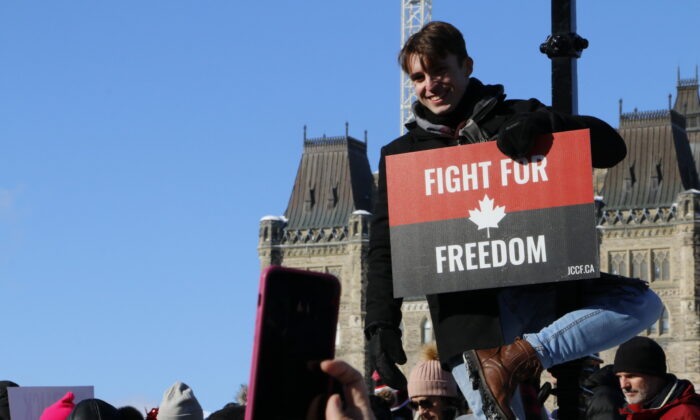The deputy solicitor general for Ontario says he was told by the federal deputy minister of public safety that the Freedom Convoy protest of last winter in Ottawa had made politicians vulnerable.
The handwritten notes from Mario Di Tommaso, Ontario’s deputy solicitor general, were entered as evidence at the Emergencies Act inquiry on Nov. 9.
Di Tommaso had a call with then-Deputy Minister of Public Safety Rob Stewart on Feb. 3, in which Stewart provided information on the protest.
The notes written in bullet points mention that “Political are very exposed.”
Di Tomasso provided his interpretation of that comment from Stewart in his interview summary with the commission.
“Mr. Di Tommaso understood Mr. Stewart to be referring to Mr. Stewart’s view that federal politicians were politically vulnerable,” says the summary.
The notes provide further insight into how the protest was being perceived by the federal government’s Department of Public Safety.
Stewart reportedly spoke of there being “no outbreaks of violence” and mentioned “far right extremism.”
“Not going to be able to move them once they are here,” say the notes. “How do they leave,” and “Change in policy or de escalation.”
‘Not Necessary’
Di Tomasso started testifying before the commission on Nov. 9, but the examination was suspended early when commission counsel Gabriel Poliquin suddenly collapsed and was taken away by paramedics.
His testimony will continue on Nov. 10 and will touch on issues of concern for the inquiry according to his interview summary.
The inquiry is seeking to determine whether the government was justified in invoking the Emergencies Act on Feb. 14 to clear cross-country protests and border blockades demanding the lifting of COVID-19 restrictions.
In his role, Di Tomasso is the direct supervisor of the Ontario Provincial Police (OPP) Commissioner Thomas Carrique.
Carrique testified at the inquiry on Oct. 27 and said not all tools had been exhausted before invoking the act.
Di Tomasso’s interview summary says that his “personal opinion is that the federal use of the Emergencies Act was helpful, but not necessary.”
This view has been shared by other senior police officers that testified so far before the commission.
Di Tomasso said that Ontario had dealt with the blockade at the Ambassador Bridge in Windsor with the provincial declaration of an emergency and an injunction. The protest was cleared by the time the act was invoked.
Regarding the trucker-led protest in Ottawa, Di Tomasso qualified it as a “significant inconvenience” that did not present an “overriding public safety risk,” according to the interview summary.
Push Back
Di Tomasso’s interview summary also mentions a call he participated in with government officials from the City of Ottawa and the federal government on Feb. 6.
During the call, National Security Advisor Jody Thomas reportedly attempted to suggest that Ontario should be dealing with the protest.
Di Tomasso responded that protesters were in Ottawa because of federal mandates, hence the federal government had a “significant role to play in achieving a resolution,” says the interview summary.
“Moreover, it was open to the federal Government [to] consider a number of possible policy or operational responses to the protests: they could meet with protesters, modify federal vaccine mandates or provide necessary resources for a police response.”

